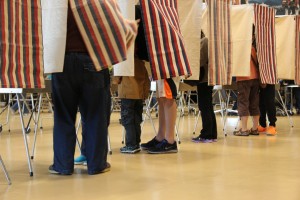
When Anchorage voters head to the polls Tuesday, they’ll not only be picking Assembly and School Board candidates, but also weighing in on several significant ballot measures.
Here are the basics on the $138,230,982 in total debt-service payments for the General Obligation bonds on the line this year.
There are nine measures all together, and if you have kids in the schools, own a house, think marijuana should be taxed, use the roads, the parks, or rely on cops and firefighters–then you’ve got a dog in the fight on these issues.
When you go into the voting booth, look at the ballot, and see Prop 1, the bond for capital improvements in Anchorage schools it’s a $49,255,000 proposition.
That money is for things like new roofs, security camera upgrades, and replacing 27 school buses. And the tax burden is spread area wide, so regardless of whether you live in Birchwood or Bear Valley, the owner of a $300,000 dollar home would be paying about $33 dollars in taxes on this bond.
Proposition 2 is a measure about taxing marijuana. Municipal officials expect the cost of administering cannabis businesses to be covered by a 5 percent retail tax on marijuana products. But adding a whole new tax means amending the charter–which you can’t do unless you get 60 percent of the vote. A “yes” vote on prop 2 means you support a marijuana tax, along with a mechanism outlined in the proposition itself that gives the Assembly the power to increase or decrease the tax rate by 2 percent every other year, up to a ceiling of 12 percent or a floor of zero.
While concerns have been raised over the Assembly potentially taxing commercial cannabis out of business, members of the body say nobody knows what the administrative costs will be, and the conservative adjustment mechanism gives them the flexibility to adapt as the industry takes shape.
Prop 3 is a $3,065,000 bond spread over the whole municipality, the majority of which would go for an upgrade to the 911 system and replacing ambulances.
Propositions 4, 5, 6 and 7 are bonds that go–respectively–for parks and trails, roads and drainage areas, a new fire engine, and improvements to police facilities. But unlike the measures above, these aren’t area wide. Property owners within the Anchorage Bowl, for example, will see a few dollars up-tick on their taxes if prop 4 passes and certain parks and trails get improvement work. But communities outside the Parks and Recreation Service Area like Eagle River and Girdwood won’t be contributing to that bond. Still, everyone is asked to vote on service area bonding propositions.
Prop 8 is tricky because it’s a charter amendment without a ton of money on the line. At least not right now. This is really more of a political question about the formula for calculating the tax cap and how to plan a city budget. Without getting too far into the weeds, conservatives on the Assembly are pushing for a yes vote to make the calculation method firmer, while the administration believes the current model gives the city more flexibility in budgeting as the state’s fiscal situation shifts around. A “no” vote keeps things the way they are now, a “yes” vote reverts the calculation back to its model ahead of an October Assembly vote.
Prop 9 is important if you live in Girdwood. This is the vote residents have to make about how they’ll pay for police once the State Troopers leave this summer. One option on the table contracting with the police department in Whittier. A yes vote amends the municipal code so that residents living within the Girdwood Valley Service Area will use property taxes to pay for policing costs.
Looking for more information on municipal elections?
- Alaska Public Media’s RUNNING interviewed every candidate for Assembly seats in East Anchorage, South Anchorage, West Anchorage, Midtown, and Chugiak-Eagle River, as well as School Board seats A and B. Don’t have time for the full half-hour? We’ve got short highlight versions, too.
- Don’t know which Assembly seat falls in your district? The Clerk’s Office has maps for that.
- Don’t know where your polling place is? The Clerk’s Office has a location-finder that can help you with that.
- And there is a clear, concise review of the ballot by the Anchorage League of Women Voters.
Polls on election day open at 7 a.m. and close at 8 p.m. KSKA 91.1 FM will have live updates starting at 9 p.m. as results come in throughout the night, or you can follow information on our live-blogging platform throughout Tuesday evening at alaskapublic.org.
Zachariah Hughes reports on city & state politics, arts & culture, drugs, and military affairs in Anchorage and South Central Alaska.
@ZachHughesAK About Zachariah




